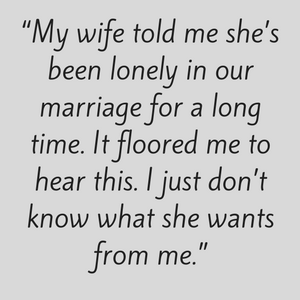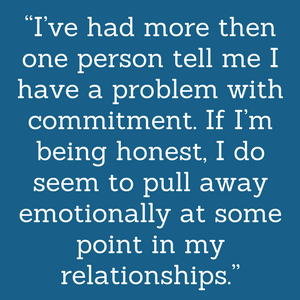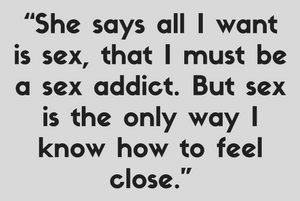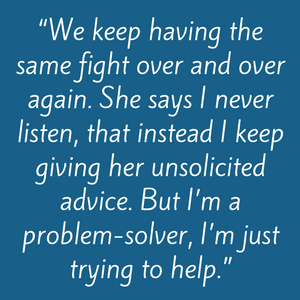Let the journey of self-discovery enrich your life...
New Men’s Therapy Group Forming
Do you struggle to identify and communicate your emotional needs?
Have you gotten feedback that you’re closed off, emotionally distant, or that you have a fear of intimacy?
Is it a challenge for you to be emotionally vulnerable and open with your spouse/partner?
Do you become overwhelmed or increasingly impatient with what your spouse/partner asks of you?
Over the years, the men I work with in individual and couples counseling have asked about additional resources to help them with the demands of committed intimate relationships. I’ve designed a group for men who want to take the next step in self-growth; men who are motivated to become better communicators and more emotionally present and available as husbands and partners.
~~~
How to be a better husband/partner men’s group
Increasingly men are being called on by their spouses and partners to give more of themselves in their relationships: to be more communicative, to be a better listener, to show greater empathy, to be present and responsive.
The men I see in my therapy practice want to make their wives/partners happy, but many find themselves floundering, despite efforts to step up their game and make things right.
But as you may painfully know, if you don’t have the right tools, increased effort can only take you so far.
Rather than blaming someone else for our relational struggles, it’s important for men to acknowledge that some of us are ill-equipped in the world of emotions and intimacy. When you consider how boys are often shamed if they show vulnerable emotions, it’s easier to see why this might be the case.
These relationship challenges require certain skills we haven’t learned — despite our love and desire to give our wives/partners what they need, we may keep missing the mark.
And when we keep missing the mark, from our mate’s perspective, we repeatedly fail to live up to our promises. They have a point.
Why do some men struggle to form deep, intimate connections?
1) Some men have had tough childhoods, difficult relationship experiences (with parents, siblings, peers) that caused a protective psychological wall to go up — a wall that makes emotional intimacy and openness difficult. Instead of bricks and mortar, this wall is built from the childhood wounds of shame and fear.
Early painful experiences can negatively shape how men relate and connect as adults.
In the group we will examine how early childhood events shaped our capacity to form intimate connections as adults.
2) Even for those who’ve had decent or good childhoods, many men have been socialized to turn away from their psychological needs. We’ve internalized powerful messages about what a “real man” should think, feel and do (and not think, feel and do).
Our internalized masculine code is deeply rooted in our psyches and branches out into every aspect of our being. Our capacity for communicating our emotional needs and connecting deeply to our partner is profoundly shaped by our socialization as men.
And when these deep-seated parts of our identity are rigidly clung to (often without our awareness that this is occurring), we may inadvertently close off the parts of ourselves that our wives/partners desperately want access to.
In the group we will examine how our masculine identities/sensibilities are important strengths that we can build upon, and how they may cause blind-spots and negatively impact how we relate to our wives and partners.

~~~
Led by Dr. Nicastro, the central theme guiding the small group (limited to seven participants) will be how and why men may turn away from and shut down certain experiences and, in doing so, inadvertently close parts of themselves off to their spouse/partner.
How to be a better husband: Group objectives
Expand mindfulness to help you attune to your underlying psychological and emotional needs, and practice ways to effectively communicate those needs;
Examine your emotional triggers — those self-experiences that are difficult to tolerate and that cause you to move into anger, passive-aggressiveness, or withdrawal mode;
Explore each member’s internal barriers to being an emotionally present and available spouse/partner;
Share your struggles and successes as husband/partner and be attentive and present while other group members share their struggles and successes;
Develop practical strategies, mindfulness, and insight-oriented approaches to help you more effectively navigate the challenges inherent to your marriage or intimate relationship;
Examine the relational patterns that unfold between group members throughout the group process, which will offer opportunities for in-depth self-examination in a safe, supportive, encouraging setting.
Is this group right for you?
Prior to joining the group, a 45-minute individual meeting with Dr. Nicastro will be required to help determine whether the group is right for you. (There is no cost for this initial meeting.)
You do not have to be in counseling to join the group, and if you are currently in individual or marriage/couples counseling, the group can serve as an additional resource to reaching your goals.
Group Information
Day/time: Monday evenings from 6:30pm-8:00pm (90 minutes)
Frequency: Weekly
Cost: $50/meeting
Start date: Starting soon, specific date to be announced
The group will be limited to 7 members.
For more information about the group, or to set up your initial no-cost appointment (to determine whether the group would be a good fit for you), contact Dr. Nicastro (512-931-9128 or rich@RichardNicastro.com).



